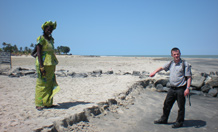
Fieldwork course in The Gambia
Research into global education
Partnerships between the West and developing countries are those where schools in England are being encouraged to link up with partnership schools in Africa, Asia and Latin America as part of a government initiative.
The University of Exeter will be examining this initiative by investigating courses for teachers designed to develop their understanding of the potential of global educational partnerships and relations between the two countries concerned.
The research investigates the learning of teaching professionals in the UK, Gambia and Southern India. This three year research project is being led by the University’s Graduate School of Education and has received £323K funding from the Economic and Social Research Council (ESRC) to critically assess the global partnership courses which explore culture, education and policies. It will investigate ways in which the courses challenge stereotypes, develop understanding of relationships with the country, people and resources and the impact the study visit has on the host countries.
Dr Fran Martin, Senior Lecturer in Education at the University of Exeter said, ‘A colonial view of partnership countries is potentially being mirrored in global partnerships and then replicated in school classrooms. Although there are well meaning teachers, they often don’t have the tools available to support them in providing a more rounded understanding of the countries, their expertise and what they have brought to the world of science and humanities. The study visit courses under investigation use different approaches to challenging colonial views and it will be interesting to learn what impact they are having’
A reason for the development of the research project is based on a world where there are lots of global issues that effect everyone at a local level, such as economic inequality, climate change, war and conflict. There is a concern that the ways of understanding the world are mainly Western and if this continues to be the dominant, we may not be successful in dealing with those issues.
The organisations involved in the University of Exeter’s research project are those involved in two global educational partnerships: one between Tide Global Learning, Birmingham and the National Environment Agency of The Gambia the other between Canterbury Christ Church University and the Goodwill Children’s Home in Tamil Nadu, India. These four organisations are working in collaboration with the University and the research consultants in The Gambia and India.
Dr Sidibeh from The Gambia University, and Dr Raja from Gandhigram Rural University, have been brought in as research consultants with a responsibility to assist in both data collection and analysis from teachers in their respective countries. They will also be involved at a later stage in the project in sharing the findings across a range of educational platforms.
The importance of having research consultants who live and work in the countries involved in the study is imperative to this type of project research, according to Dr Martin. She said, ‘Gaining non-western perspectives on global partnerships is much needed within education. Not only will the research consultants be able to conduct the research in ways that are sensitive to local cultural contexts, but also the researchers in each country will be able to learn from each other about different cultural contexts for research, and so extend research skills in all three locations.’
Date: 5 March 2010
